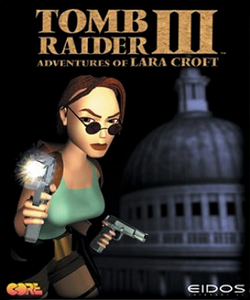Tomb Raider 3
| Tomb Raider III | |
|---|---|
 |
|
| Developer(s) | Core Design |
| Publisher(s) | Eidos Interactive |
| Producer(s) | Troy Horton |
| Designer(s) | Jamie Morton Richard Morton Andrew Sandham |
| Programmer(s) | Chris Coupe Martin Gibbins |
| Writer(s) | Vicky Arnold |
| Composer(s) | Nathan McCree |
| Series | Tomb Raider |
| Platform(s) | Microsoft Windows, PlayStation, Mac OS |
| Release | |
| Genre(s) | Action-adventure |
| Mode(s) | Single-player |
| Aggregate scores | |
|---|---|
| Aggregator | Score |
| GameRankings | 78% (PS) 73% (PC) |
| Metacritic | 76/100 |
| Review scores | |
| Publication | Score |
| CVG | |
| Edge | 8/10 |
| EGM | 27.5/40 |
| Famitsu | 30/40 |
| Game Revolution | C+ |
| GameSpot | 7.5/10 (PS) 6.9/10 (PC) |
| IGN | 8/10 (PS) 7.7/10 (PC) |
| OPM (US) | |
| The Electric Playground | 7.5/10 |
Tomb Raider III: Adventures of Lara Croft, or simply Tomb Raider III, is an action-adventure video game developed by Core Design and published by Eidos Interactive. It was originally released for the PlayStation and Microsoft Windows platforms in 1998. Tomb Raider III is the third instalment in the Tomb Raider video game series and a sequel to Tomb Raider II. The story of the game follows archaeologist-adventurer Lara Croft as she embarks upon a quest to recover four pieces of a meteorite that are scattered across the world. To progress through the game, the player must explore five locations (India, South Pacific, London, Nevada, and Antarctica) and complete a series of levels that involve solving puzzles, jumping over obstacles, and defeating enemies.
Tomb Raider III was built on an upgraded version of the Tomb Raider engine that was used in its predecessors. The engine offers better speed efficiency and new graphical features such as coloured lighting and triangular polygons, allowing developers to achieve greater detail and more complex geometry. The game was designed to be more in line with the puzzle-solving gameplay of the original Tomb Raider as opposed to the more shooting-oriented style of Tomb Raider II. Development of the game was led on the PlayStation console, with the Microsoft Windows version being simply a better-looking conversion of it.
...
Wikipedia
